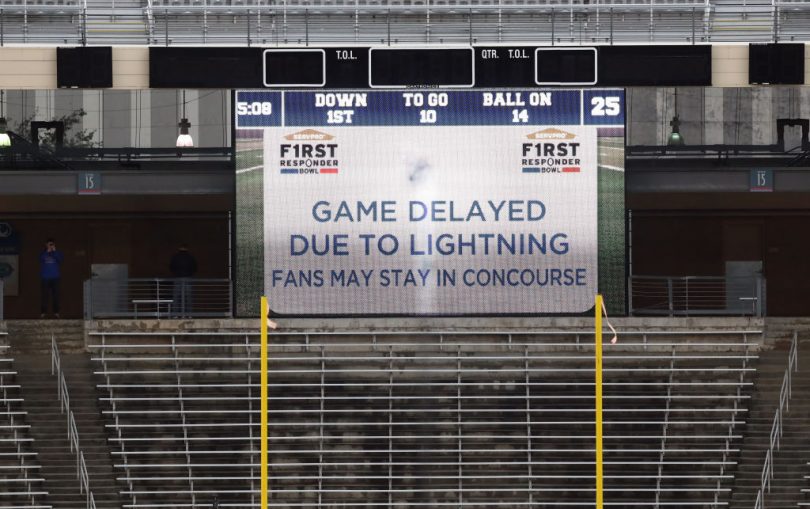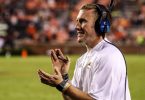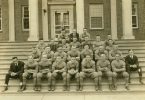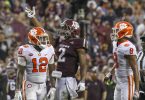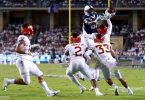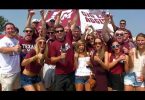DALLAS – It’d likely have been difficult to tell whether those were snickers or sneers worn by six City Council members on Wednesday afternoon as lightning bolts danced about the famed Cotton Bowl in the Fair Park community.
It certainly seemed fitting that this game, the First Responder Bowl, which officially entered Rod Serling’s Twilight Zone, was the first bowl game in history to be canceled — as far as anybody could remember –because of day-of-the-game weather.
After 1 1/2 hours of a lightning delay, the bowl’s stakeholders, including athletic directors, head coaches and, of course, ESPN, decided to call off the game between Boise State and Boston College. The powers-that-be decided that the window to get the game in was simply too small – perhaps non-existent — before Mother Nature’s rolling thunder made subsequent repeat appearances.
Boston College, making its first trip to the Cotton Bowl since the Doug Flutie gang beat Houston in 1985, led 7-0 with 5:08 left in the first quarter. Running back AJ Dillon beat everybody with a 19-yard scoring run, including, just barely, the first flash of lightning.
“I’ve never seen a football game canceled before,” said L.J. Spinnato, head coach at Choate Rosemary Hall High School in Connecticut, who was here to watch three former players, Will Harris, John Fadule and John Tessitore, all of BC. “It’s tough. I wanted to see my boys play.
“They’re going to be pissed, I’m sure.”
Bowl officials said tickets are non-refundable. BC announced afterward that it will offer refunds to fans who purchased tickets through the school. It was unknown if Boise State would do the same.
However, the price of a plane ticket and hotel room plus, perhaps, missed time with family at Christmas, are completely out of the schools’ hands. Spinnato spent a “fair amount,” although his itinerary also included a trip to the Sun Bowl in El Paso. Another one of his former players was in that game. (Choate Rosemary Hall can play some football apparently.)
No one asked the city – a key partner in this game — what it thought about canceling.
That’s significant, especially because this game was likely one of the last two postseason college football games in historic Fair Park.
With the city of Arlington now in the football business, and with the Texas Rangers’ Globe Life Park’s planned conversion for use by the born-again XFL in 2020, the First Responder Bowl in all probability will move when the game’s contract is up with the city of Dallas after the 2019 game.
To Arlington is far from a done deal — the game first has to survive this snafu — but bowl officials said this week that a move west is definitely “on the table.”
Whether that kind of talk is merely leverage for when the next contract is being negotiated, who knows.
But a reluctant Dallas did just enough to keep the game at the Cotton Bowl this year and next.
A vote taken by the council in September to give ESPN $300,000 in subsidies over two years to keep the game at the Cotton Bowl was split, 8-6, and decidedly contentious.
Supporters, who included Mayor Mike Rawlings, a former defensive lineman at BC, pointed to the benefit of television exposure, the more than two million viewers expected to tune in who had presumably never heard of Dallas.
If trending on Twitter is an indication, the city certainly still got a good amount of exposure. The twitterverse was all Gladys Kravitz about the cancellation.
Jennifer Gates, the councilwoman with the more famous maiden name of Staubach, is on record as supporting the Cotton Bowl. Why spend money on the Cotton Bowl, she has said, if Dallas isn’t going to host games there?
It’s a fair question, one that will receive more consideration until the annual Texas-OU contract comes due in the mid-2020s.
The 88-year-old Cotton Bowl stadium is terribly outdated. If it’s amenities you want, you will need to go to just about any suburban high school stadium in Dallas and Fort Worth. But what it lacks in creature comforts, it more than makes up for in a marvelous history.
Ghosts roam that place, make no mistake about it.
The detractors on the council have argued that the city is not getting good value for the assets being spent out of the people’s treasure chest. Not only that, it’s money, they said, that is needed elsewhere.
Money doesn’t grow on trees, no matter what the IRS thinks, but other local tax entities, such as school districts and cities, have found that out in recent years. Complaining to a congressman about your tax burden and how that money is being spent and having the same conversation with your city councilman or woman, who might live next door or at least within an egg-toss distance, are two different things.
They hear and see you, and don’t want their house wrapped in toilet paper.
The most vocal of the no men and women on the council needed to look no further than last year’s game between Utah and West Virginia, which drew an (almost always-deceiving) announced 20,507. City officials said that figure was more like 9,300 in a 92,000-seat stadium.
In nine games, though, the bowl, founded to replace the Cotton Bowl game that moved to AT&T Stadium, has never drawn more than 50,000.
ESPN was asking for $500,000 less than the previous two years, but, even then, negotiations dragged and over the months the prospects for subsidy dimmed.
That asking price was actually part of the “process” of city government.
A committee asked the director of the Parks and Recreation Department – where the money comes from – to cut the subsidy from $800,000 to $300,000.
Committees’ recommendations to cities council weigh heavily in a member’s discernment. If the committee said no to $800k, the council was likely to back it. So, 800k was likely never an option for ESPN.
It was then, coincidentally perhaps (perhaps not), that bowl officials rebranded the game, renaming the Heart of Dallas Bowl the First Responder Bowl.
After all, saying no to the first responders is not politically expedient. Who doesn’t love firemen when your house is burning down or a ready police officer when a gentleman carrying a piece comes demanding the contents of your wallet?
The critics and cynics pounced. One of these days, councilman Scott Griggs said, ESPN will call the game the “First Responders, Veterans and Orphans Bowl” to gain the city’s assistance.
Officials have said that between money collected through parking fees and concessions, the city makes some money. There wasn’t much to be made in concessions on Wednesday, however. Parking was light, too, as crowds again stayed away.
Others insisted at the time that ESPN and the Dallas Sports Commission will work to bring better matchups.
That sounds like politico-speak, too. The matchup is really out of their hands, though ESPN does have some flexibility at times.
This year’s game was supposed to feature teams from the Big Ten and Conference USA but was adjusted to the Mountain West and ACC because of the bowl eligibility of teams and other bowl assignments.
For the record, Wednesday’s game was called out of an abundance of concern for player safety.
The skeptics wondered with a wary eye, what with ESPN and the television matrix involved.
“Player safety and fan safety, including people in their community, should always be first before we get into subsidies and things like that,” said Brant Ringler, executive director of the game. “Those questions, if the city has questions on that, we can get into that later. As of right now, player and fan safety were first and foremost in our minds right now.”
The decision turned out to be prescient. The forecast of wave after wave of thunderstorms was as spot-on as the turning of a new year every Jan. 1.
But those against giving out subsidies to keep this game in Dallas got more ammo on Wednesday for the next time ESPN comes looking for the taxpayers’ help.
And when and/or if the council says “no,” Arlington will be there waiting.
Those guys are always willing to play ball … weather or not.

